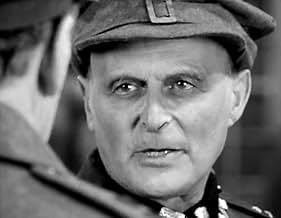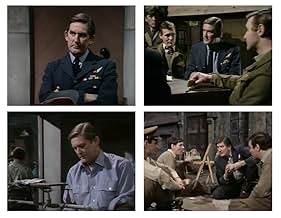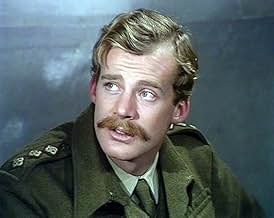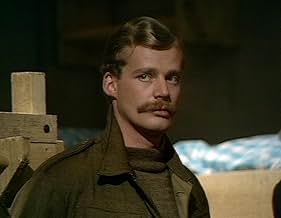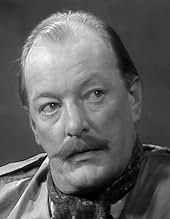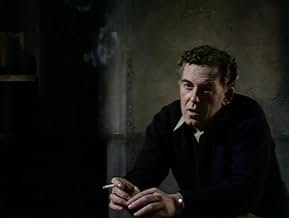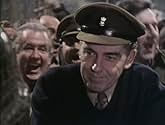Colditz
- Série télévisée
- 1972–1974
- 50min
NOTE IMDb
8,3/10
1,1 k
MA NOTE
Ajouter une intrigue dans votre langueThe series deals with Allied prisoners of war imprisoned at Colditz Castle and their many attempts to escape captivity, as well as the relationships formed between the various nationalities ... Tout lireThe series deals with Allied prisoners of war imprisoned at Colditz Castle and their many attempts to escape captivity, as well as the relationships formed between the various nationalities and their German captors.The series deals with Allied prisoners of war imprisoned at Colditz Castle and their many attempts to escape captivity, as well as the relationships formed between the various nationalities and their German captors.
- Nomination aux 3 BAFTA Awards
- 1 victoire et 3 nominations au total
Parcourir les épisodes
Avis à la une
Some strange and uniformed comments/criticisms about this excellent series.
One says that was a 'goof' to show prisoners in 'dress uniforms'. A brief search for photos of Colditz prisoners online will show that all POW officers possessed proper uniforms, as under the Geneva Convention these could be requested via the Red Cross. It would have been an unlikely mistake, as Pat Reid was an adviser on the series.
Another says that there were no Americans in Colditz. There were in fact three Americans: Colonel Florimond Duke, Captain Guy Nunn, and Alfred Suarez.
Some liberties were clearly taken for dramatic effect. For example, the famous 'Tea Chest' escape is featured. David McCallum's character, Simon Carter was based on the real Tea Chest escaper, 'The Medium Sized Man' aka Fl Lt Dominic Bruce OBE MC AFM KSG (Wikipedia has a very comprehensive biography, well worth a read) who did not deliberately give himself up as Carter does, but was only caught weeks later in Danzig.
For the most part, this series gives a fairly accurate portrayal of the struggle between the inveterate escapers (you were only put in Colditz if you had escaped from somewhere else, and got caught) and the well trained German security officers.
One says that was a 'goof' to show prisoners in 'dress uniforms'. A brief search for photos of Colditz prisoners online will show that all POW officers possessed proper uniforms, as under the Geneva Convention these could be requested via the Red Cross. It would have been an unlikely mistake, as Pat Reid was an adviser on the series.
Another says that there were no Americans in Colditz. There were in fact three Americans: Colonel Florimond Duke, Captain Guy Nunn, and Alfred Suarez.
Some liberties were clearly taken for dramatic effect. For example, the famous 'Tea Chest' escape is featured. David McCallum's character, Simon Carter was based on the real Tea Chest escaper, 'The Medium Sized Man' aka Fl Lt Dominic Bruce OBE MC AFM KSG (Wikipedia has a very comprehensive biography, well worth a read) who did not deliberately give himself up as Carter does, but was only caught weeks later in Danzig.
For the most part, this series gives a fairly accurate portrayal of the struggle between the inveterate escapers (you were only put in Colditz if you had escaped from somewhere else, and got caught) and the well trained German security officers.
This grim and claustrophobic series chronicles the lives of the allied prisoners in the supposedly escape-proof Colditz Castle designated Oflag IV-C during World War II. It describes events from the arrival of the first British prisoners after Dunkirk to join the existing Polish, French and Dutch prisoners, until the liberation of the castle by the Americans in 1945.
It records many attempts to escape, as well as the relationships formed between the various nationalities and their German captors. A grudging respect gradually develops between the two sides. Colditz is a Sonderlager (special camp), designed by the Nazis to hold high-risk and later Prominente (politically important prisoners).
Lieutenant Colonel John Preston (Jack Hedley) is the Senior British Officer (SBO). He is the very embodiment of British stiff upper lip. He gets along well with the Commandant, whom he respects but is adept at manipulating.
The Commandant (Bernard Hepton), known only by his forename Karl, is a moderate and honourable Oberst (Colonel), a Wehrmacht man, who adheres to the Geneva Convention to the best of his ability. He is anxious to be seen by the German authorities as running an orderly camp in order to prevent the SS and Gestapo from taking control. He relies on Colonel Preston to keep the British prisoners in check.
Captain Pat Grant (Edward Hardwicke) a young, hot-headed RAF officer who frequently finds himself in solitary confinement, is the first British escape officer in Colditz. His post is later taken by Flight Lieutenant Simon Carter (David McCallum), so that Pat Grant can himself attempt escape.
Hauptmann (Captain) Franz Ulmann (Hans Meyer) is the Security Officer at Colditz. His job is to prevent escapes. Like the Commandant, he is a Wehrmacht man who has no love for the SS. Because of his careful planning and sharp eyes and mind, he is able to avert many escape attempts as well as many attempts of the SS to take over the camp.
Major Horst Mohn (Anthony Valentine) is a very highly connected Nazi Party member. He constantly finds himself in conflict with the Commandant, and is frustrated by what he perceives as the treating of prisoners with 'kid gloves'. The prisoners loathe him. Unfortunately for them, he is ruthlessly intelligent and occasionally pulls off a devastating coup.
Almost all of the events depicted in the series have a basis in truth. While there is not a direct one-to-one relationship between the real and televised characters, most of the televised characters are loosely based on actual persons.
A major goof is that throughout the series captured British fliers are shown wearing full dress uniform, which of course they would not have worn on flying operations.
It records many attempts to escape, as well as the relationships formed between the various nationalities and their German captors. A grudging respect gradually develops between the two sides. Colditz is a Sonderlager (special camp), designed by the Nazis to hold high-risk and later Prominente (politically important prisoners).
Lieutenant Colonel John Preston (Jack Hedley) is the Senior British Officer (SBO). He is the very embodiment of British stiff upper lip. He gets along well with the Commandant, whom he respects but is adept at manipulating.
The Commandant (Bernard Hepton), known only by his forename Karl, is a moderate and honourable Oberst (Colonel), a Wehrmacht man, who adheres to the Geneva Convention to the best of his ability. He is anxious to be seen by the German authorities as running an orderly camp in order to prevent the SS and Gestapo from taking control. He relies on Colonel Preston to keep the British prisoners in check.
Captain Pat Grant (Edward Hardwicke) a young, hot-headed RAF officer who frequently finds himself in solitary confinement, is the first British escape officer in Colditz. His post is later taken by Flight Lieutenant Simon Carter (David McCallum), so that Pat Grant can himself attempt escape.
Hauptmann (Captain) Franz Ulmann (Hans Meyer) is the Security Officer at Colditz. His job is to prevent escapes. Like the Commandant, he is a Wehrmacht man who has no love for the SS. Because of his careful planning and sharp eyes and mind, he is able to avert many escape attempts as well as many attempts of the SS to take over the camp.
Major Horst Mohn (Anthony Valentine) is a very highly connected Nazi Party member. He constantly finds himself in conflict with the Commandant, and is frustrated by what he perceives as the treating of prisoners with 'kid gloves'. The prisoners loathe him. Unfortunately for them, he is ruthlessly intelligent and occasionally pulls off a devastating coup.
Almost all of the events depicted in the series have a basis in truth. While there is not a direct one-to-one relationship between the real and televised characters, most of the televised characters are loosely based on actual persons.
A major goof is that throughout the series captured British fliers are shown wearing full dress uniform, which of course they would not have worn on flying operations.
This outstanding series is the kind of psychological drama at which the British excell. Set almost entirely within a reconstruction of the now-famous castle-fortress prisoner-of-war camp during WWII, there is little in the way of physical action. Instead we're treated to some of the best form of "mind games" and psychological manoeuvring and competition you can hope to see on TV, as the two sides constantly strive to get one over on the other. The Allied prisoners are determined not to be beaten mentally by their surroundings and look for every possible means of escape, while the Germans are always on their toes, looking for clues about possible break-outs and ways in which the Allied prisoners are trying to outsmart them. I couldn't tear myself away from the series when it first came out in Britain, and I was pleased to see how little it had aged when it was reshown on the History Channel a couple of years ago. Excellent acting and strong story lines make this a must-see for me. Out of 10, I'd rank it about 13.6!!
I found this show very very good. I really enjoyed the acting, the costumes and the use of the German Language. (as a student of the German language, it was rather nice knowing what they were saying and not some gibberish to throw the average viewer off) The escape stories and sub-plots kept me on the edge of my seat. To me, this was not some mindless TV show where you switch your brain off. What held my interest was that it made you think. It was almost like playing chess. Who makes the next move? Robert Wagner, Jack Hedley and David McCallum are my favorites but I must say, I also found some of the German actors appealing too. Hans Meyer and Bernard Hepton were both splendid. It was nice seeing Mr. Hepton play a Kommandant after seeing him play a barkeeper in Secret Army (another British war/drama) Mr. Meyer's character (Hauptmann Ulmann) was as cold as ice and sometimes, those are the hardest characters to play. (his eyes - how many closeups did that guy have?) This show was not only entertaining, but I found it to be quite educational too. I plan to visit Colditz on my next trip to Germany. Unfortunately, I never did see the end of the series, so I don't know how it ends. I only saw up until end of first season (gone away part 1 and 2) so, if anyone saw the series (or remembers it) please feel free to e-mail me and tell me what happens. I think when History Channel decides to play it again, I'll probably be in Germany and these shows and channels are not available - even on satellite.
When the very popular and succesful "Family at War" series finished a new wartime drama was made about the stories and exploits of British prisoners of war being held at Oflag 4c known as Colditz. This BBC production ran two seasons from 1972 to 1974 and although repeated, perhaps twice, it wasn't shown again after it's final airing in 1975 until it was broadcast on UK Gold many years later. The series mostly centered around the British contingent and was filmed mostly on video which only added to the claustrophobic feel of being incarcerated. This castle deep inside Germany was used as a POW camp to house highly decorated or prominent captured service men as well as troublesome officers who were well known escapers. Other nationalities included French, Dutch, Polish as well as Americans.
The German captures were headed by the Kommandant a veteran of WW1 and strictly by the book man. Straight backed a committed patriot but dignified, took his responsibilities very seriously and felt that observing the Geneva convention was vital in helping German POW's deal with their captivity in allied POW camps, therefore, he was tough but fair. This was clearly on display when he finally understood Colonel Preston's predicament after the death of his wife in England and the compassionate act of not returning a letter with other personal effects to a dead serviceman's wife, giving the impression he'd never received the last letter.
He was supported by the very imposing Hauptmann Ulmann his security chief who was also committed to his duties but nevertheless earned the respect of the POW's as he too observed the Geneva convention. This was in sharp contrast to the Second in command Major Mohn who came in the second season. He was committed to the cause but arrogant as well as being a strong party member who had connections with the hierarchy in the Nazi movement. Although decorated and wounded in combat because of his underhanded methods towards his duties and his constant provocation towards the prisoners he eventually became despised.
The series found its feet in the 4th episode of the first season which centered on the arrival of Colonel Preston who became the senior British officer. After some initial resistance from the British prisoners, he soon gained the respect of them. Through his ability to command he brought a sense of purpose and discipline to the officers by initiating a rotation of officer of the day, daily orders being posted and the forming of an escape committee. The other main senior British officers were Captain Pat Grant the head of the escape committee, Flight Lieutenant Carrington, submariner Lieutenant Dick Player and the short tempered and moody flight Lieutenant Carter.
Despite the first series climaxing on a two-part episode with an attempted break out of four British officers, I think that season two was just slightly better, probably benefiting from the presence of the nasty Major Mohn. Two seasons were probably enough for the series and ended with the war coming to an end with the United States and Russian forces closing in on the castle. I think that a short 2-3-part miniseries a few years later centering around a reunion of some of the officers with the intention of tracking down Horst Mohn and trying to bring him to justice would have been satisfying. It didn't happen, nevertheless a great series to watch, I'd highly recommend Colditz.
The German captures were headed by the Kommandant a veteran of WW1 and strictly by the book man. Straight backed a committed patriot but dignified, took his responsibilities very seriously and felt that observing the Geneva convention was vital in helping German POW's deal with their captivity in allied POW camps, therefore, he was tough but fair. This was clearly on display when he finally understood Colonel Preston's predicament after the death of his wife in England and the compassionate act of not returning a letter with other personal effects to a dead serviceman's wife, giving the impression he'd never received the last letter.
He was supported by the very imposing Hauptmann Ulmann his security chief who was also committed to his duties but nevertheless earned the respect of the POW's as he too observed the Geneva convention. This was in sharp contrast to the Second in command Major Mohn who came in the second season. He was committed to the cause but arrogant as well as being a strong party member who had connections with the hierarchy in the Nazi movement. Although decorated and wounded in combat because of his underhanded methods towards his duties and his constant provocation towards the prisoners he eventually became despised.
The series found its feet in the 4th episode of the first season which centered on the arrival of Colonel Preston who became the senior British officer. After some initial resistance from the British prisoners, he soon gained the respect of them. Through his ability to command he brought a sense of purpose and discipline to the officers by initiating a rotation of officer of the day, daily orders being posted and the forming of an escape committee. The other main senior British officers were Captain Pat Grant the head of the escape committee, Flight Lieutenant Carrington, submariner Lieutenant Dick Player and the short tempered and moody flight Lieutenant Carter.
Despite the first series climaxing on a two-part episode with an attempted break out of four British officers, I think that season two was just slightly better, probably benefiting from the presence of the nasty Major Mohn. Two seasons were probably enough for the series and ended with the war coming to an end with the United States and Russian forces closing in on the castle. I think that a short 2-3-part miniseries a few years later centering around a reunion of some of the officers with the intention of tracking down Horst Mohn and trying to bring him to justice would have been satisfying. It didn't happen, nevertheless a great series to watch, I'd highly recommend Colditz.
Le saviez-vous
- AnecdotesThe series takes place from May 1940 to April 1945.
- GaffesAll of the prisoners are seen dressed in impeccable uniforms, from uniform caps with insignia down to highly polished boots. The shirts and pants are clean and pressed, and the senior officers even have ties. None of these would have been carried into battle, and even if they had been, would surely have shown signs of wear after years in prison camps. In reality the prisoners had to make due with whatever they could gather together, certainly not the high quality uniforms featured in the series.
- ConnexionsFeatured in Night of a Thousand Shows (2000)
Meilleurs choix
Connectez-vous pour évaluer et suivre la liste de favoris afin de recevoir des recommandations personnalisées
- How many seasons does Colditz have?Alimenté par Alexa
Détails
- Date de sortie
- Pays d’origine
- Langues
- Aussi connu sous le nom de
- La fuga de Colditz
- Lieux de tournage
- Stirling Castle, Stirling, Écosse, Royaume-Uni(Title sequence and exteriors)
- Sociétés de production
- Voir plus de crédits d'entreprise sur IMDbPro
Contribuer à cette page
Suggérer une modification ou ajouter du contenu manquant


